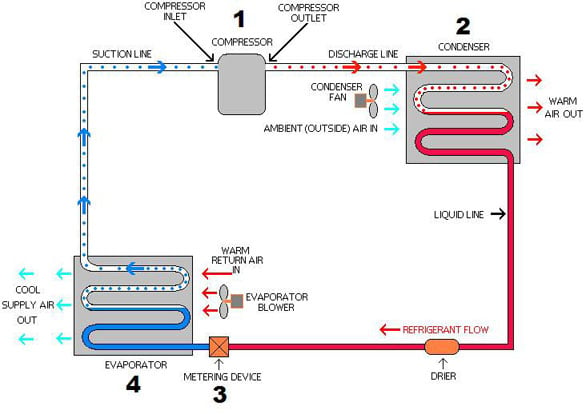The great debate over the right temperature for the thermostat has been raging since air conditioners were first invented.
Some people prefer their home at arctic temperatures year-round, while others cringe at the thought of spending that much money on cooling during the hot summer months.
Of course, if finances are part of your motivation for keeping temperatures a little higher, then you should take a moment to understand how air conditioners work. Personally, my question has always been “How much space can one air conditioner actually keep cool?”
Not every air conditioner is equally efficient, but there are some important rules of thumb for how effectively a single unit can cool your space.
So How Much Can One AC Unit Cool?
In general, a quality air conditioner can reduce your indoor temperatures about 20 degrees Fahrenheit compared to outside, running at full power. However, the amount of space the air conditioner can cool depends on its capacity. A great shortcut for understanding capacity is that it takes about 25 BTU (British Thermal Units) of power to cool one square foot of space. So, a 12,000 BTU air conditioner can cool a room of about 500 square feet by about 20 degrees.
Ready to learn more detail about how to keep your home cool efficiently? Then read on.
How Air Conditioners Work
In general, air conditioners work by absorbing heat and blowing it out of your home. The air conditioner doesn’t “make cold air” so much as it “removes heat from the air.” This is an important difference. But how does this happen?
Just about every air conditioner works via a refrigerant system. Refrigerant is a substance like freon, which is a gas at room temperature but can easily be pressurized into a liquid. A motor in your air conditioner, known as the compressor, squeezes the refrigerant into a liquid state and pumps it through a bunch of tubes.
These tubes are big enough that the refrigerant can expand back into a gas. This takes energy, so the refrigerant absorbs heat along the way. Warm air from outside is blown around the tubes and some of the air’s heat is absorbed by the tubes carrying expanding refrigerant – that’s the cool air that winds up in your house.
Meanwhile, the refrigerant that’s become a gas is sent back to the compressor, where it’s squeezed back down into a liquid. This makes it release the heat it just absorbed, and a fan blows outside air past the compressor to blow away the extra heat. That’s why air conditioners blow hot air outside – it’s all the heat that the air conditioner absorbed from inside.

A typical AC system diagram.
Can It Get Too Hot for an Air Conditioner to Work?
The general process of air conditioning will always work. However, during extreme temperatures, you may notice that it seems like your air conditioner struggles to keep up. That’s not your air conditioner failing to work, though. It’s probably working just fine, but you’re running into some physics problems.
More air conditioners are designed with high temperatures of 90 to 95 degrees Fahrenheit in mind. The inside of these AC units is literally sized and designed to cool air about 20 degrees, to 70-75 degrees Fahrenheit.
If temperatures are higher than that, your air conditioner is still cooling the air by about 20 degrees. After all, the refrigerant still needs to absorb a certain amount of energy to expand back to a gas. However, above 95 degrees Fahrenheit, you’re unlikely to get your home’s temperature to 75 degrees with just one air conditioner.
How Cool Should Your House Be If It’s 100 Outside?
Because of how air conditioners work, your AC unit can likely only cool your home by about 20 degrees Fahrenheit. This is especially true in warmer weather. As a result, when temperatures skyrocket up to 100, the coolest your thermostat should be set to is 80 degrees. If temperatures rise even further, the 20 degree rule of thumb still applies.
That may seem high, but it’s still a significant difference. Plus, there are plenty of options for cooling your home more efficiently. Your AC won’t have to work as hard to keep things cool if you’re using other cooling methods as well.
How to Make an Air Conditioner More Efficient
Whether temperatures are obscenely high, or just at their regular summer peaks, it never hurts to cool your home more efficiently.
Just cranking your thermostat down as low as it can go isn’t necessarily the best option. That’s a great way to increase the amount of work your AC unit does and will lead to an impressive electrical bill later.
Instead, try some of these energy-efficient tips to keep your air conditioner less stressed and your energy bills low.
- Shut the curtains. The sun is what’s causing all the heat you’re trying to avoid in the first place. Letting it shine into your home is only going to heat things up. Close all windows and shut the curtains on the side of your home facing the sun. You can even put up a reflective barrier inside the window to keep the heat out.
- Close up hot rooms. Some rooms are just going to get warmer than others, depending on windows, insulation, and location. Close the door to that one room that always gets too warm, and spend your time enjoying cool air in the rest of the house.
- Insulate your home – it’s important in the summer, too. Just as cold air can get into your home in the winter, it can leak out during the summer. Make sure your windows and doors are properly insulated. If there’s a draft, you’re probably letting your cool air escape. You may need to caulk and seal cracks to fully insulate the home.
- Be cautious with cooking. Laundry, too. Any type of heat-based appliance is going to make your air conditioner work harder if you use it during the warm parts of the day. It’s best to do laundry or cook either first thing in the morning, or later in the evening.
- Turn off other electronics. You’ve probably noticed that things like your lights, laptop charger, and even your TV can get warm when they’re in use. Turn off and unplug electronics that you don’t need and you’ll save the energy twice over.
- Consider a smart thermostat. Smart thermostats, or any thermostat with a scheduling feature, can help you save money by keeping your home warmer when you’re away. Instead of trying to remember to raise your home’s thermostat before you leave, let the thermostat do it on its own. The difference between cooling your home 24 hours a day compared to just 12 or 16 can be huge on your power bill. Some smart thermostats can even show you your power usage, so you know exactly how much you’re saving.
- Place your thermostat wisely. Your thermostat is the brains of the AC unit, so if it’s recording the wrong temperature, you’ll get inefficient cooling. Putting your thermostat in the right place can make all the difference. That means that you need to keep it away from the air conditioner itself, if possible, as well as outside windows or doors. A central hallway or your living room wall are great places to put your thermostat, because it’s convenient to check and likely to be out of drafts or air currents.
- Consider cooling rooms individually. Whether or not you have central AC, you can get more cooling for your money by focusing on individual rooms. Plenty of people cool their homes with nothing but portable or window air conditioners.
If you want to add one of these to your home, it can be a great way to focus cooling on the room in which you spend the most time.
If you can, move the thermostat to the opposite side of the room, however, to get an accurate temperature reading. Since these units aren’t trying to cool your whole home, they use less energy, saving you money. You can also take portable units with you from room to room if you move around.
These units can be a little noisier than central AC, but they don’t have to be. I’ve written two detailed guides to the quietest window and portable air conditioners on the market. You can relax in peace and quiet while staying cool all summer long. That’s a great way to make your summer just a little better.
There are plenty of other ways to keep cool without blasting your AC and stressing the unit. Our massive guide of staying cool without air conditioning is the largest collection on the internet. With 73 ways to chill without the AC, there’s absolutely going to be at least a few tricks that you can use to beat the heat without the wallet whammy of AC all day long.
Conclusion
The right temperature for your air conditioner has to be one of the biggest arguments people have during the summer.
Whether you’re concerned about the heat or your finances, it’s a rare household where everyone has the same priorities. Keeping things cooler for less money is usually something everyone can agree on, though.
I hope this article has helped you understand how to get the most out of your air conditioning system without wasting electricity or suffering the heat.
If this content has helped you, please consider supporting us by checking out some more articles or signing up to our newsletter to get the amazing deals we share to our private mailing list.
Have a great day!
-Craig








